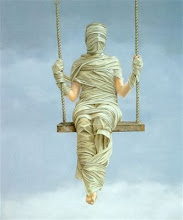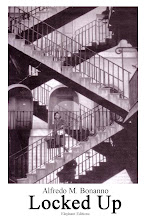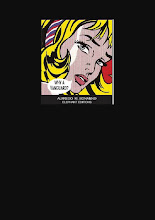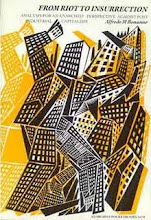The Italian State had taken care to manage the vacuum left by the broken revolutionary movement long before the revolutionaries began to think about it. So anyone who starts shouting that any means are valid in order to free comrades from prison, should not complain afterwards that they are standing alongside docile creatures who are no more than instruments in the hands of power.
Truth and lies have been intermingled in the Italian political scene recently as never before to the point of becoming a spectacle of different positions that has been democratically produced by the government and the institutional opposition aimed at holding the attention of uniformed revolutionaries.
The Naria case is a blatant example and has become an”affair” of State, a symbol of the period following the state of emergency which is based on recuperation and a generic discovery of human values. The current problems concerning prison and the process of dissociation in progress all seem to converge on this painful human event which typifies the barbarism of the mechanisms of judicial procedure and administration which, by preventing the liberation of a man who is slowly dying, demonstrate the homicidal intent of those who manipulate them.Thus the Minister Martinazzoli, head of the prison system Doctor Amato and, of course, the good Pertini (to mention only the best known of them) announced that they were opposed to the judges’ refusal (who are sovereign in the strict application of the law passed by Parliament) to the request made by Nadias’s lawyers to have him released. Apart from the human significance of the case, we should be asking ourselves what is behind these fake appeals and debates that are being organised on all sides.
We all know that the State, by approving the new law on preventive detention is preparing to change the internal control of the prisons, a more rational form of control than the one that was applied in the special prisons and the “death wings”. Thus barbarism can travel along the rails of differentiated internal sociality. The use of the judicial apparatus for exclusively political goals appears through assistance given to anyone who dissociates himself or herself from “terrorism”, and includes reductions in sentences and “possible openings”.
The State is progressively coming out of the tunnel of “ the state of emergency” and is regulating new positions of domination in all sectors of society. The period of conquest of the social sectors that had torn from it by the struggle and were independent of its interference is over; it is now preparing a new form of control. The characteristic of this control is no longer militaristic but will revolve around a strategy of consensus so as to normalize “deviant” behaviour. The State wants to promote and activate new social operators and controllers in the microstructures of this country. As well as the psychologists and sociologists, one sad figure is conspicuous: the dissocianist of antagonism.
This is what the spectacle of political positions revolving around the phenomenon of dissociation is all about (from the document of Rebebbia 51, to that by the 40 signatories of Prima Linea trial in Turin, up to the current documents of the thirteen, still from Turin, or those that came out of the Prima Linea trial in Milan). The “homogenous” sphere of influence is spreading everywhere. It is no longer a question of small groups but of a compact mass inside the prisons taking the road of dissociation, finding advocates of it outside the prisons as well as inside and giving rise to a labyrinth of positions where it is difficult to sort things out for oneself.
Everyone is waiting for further information from the State about the role it intends to entrust to these revised and corrected subjects, and this is the subject of a political battle in Parliament (there is for example a current of secular people who have dissociated themselves, one of Catholic people who have dissociated themselves, another of so-called “total” ones, and, so on).
If the majority of political prisoners found themselves drawn into the project of dissociation that the State wants to realize, on the outside things are the same. A large part of the revolutionary mileus insist on echoing the initiatives of dissociation coming out of the prisons. Even a few libertarian mileux that appear to misunderstand and thoughtlessly claim to support such a project by showing solidarity with positions adopted by a few prisoners who puffed themselves up with the term “anarchist” thereby enjoying citizenship in our movement which is over saturated with a conformity disseminated from tolerance.
The question needs to be seriously considered and analysed, especially for the negative consequences affecting our subversive activity. Adopting positions like this would lead the anarchist movement on to the terrain of poitical oooprtunism and compromise with power, a terrain dear to authoritarian elements who use it to justify their own existence and retention.
Until now a part of the anarchist movement has had nothig to do with the matter of repression and social control. The interest it is showing now is connected in particular to new positions adopted by certain libertarian prisoners who are dissociating themselves from the practices and motives that in the past made them opponents of the State and Capital.
Such a sudden convergence of interests between these prisoners and this part of the anarchist movement results from a parallelism of views concerning the value that both of them attribute to liberalism, socialism and democracy.
To be aware of this it is enough to read various articles published in several anarchist magazines which clearly give the impression of having chosen to move only in an area of study and cultural intervention.
Starting from a criticism of their own experience of struggle, the dissociated have reached the point of reducing any conflictive relationship with the institutions to nothing. They put themselves directly in a discussion and a parliamentary mediation that is attempting to recuperate all social conflict. And because this self-criticism tries, in its subjectivity, to reassert the value of the individual space that was so neglected before, it folows that it ends up adopting the utopia of modern liberalism, which would like to humanize and socialise State structures by containing them in a sphere of action that is far more restricted than the current sphere. These prisoners are converging by another road with the part of the movement that hopes to peacefully and in a utopian way empty the State of its functions, acting progressively from within by means of a use of mass libertarian culture, capable of proposing autonomous counter-structures of society. It is a project that would like to realize the liberal maxim of “minimal intervention of the State in society”. The “sed beneath the snow” that Kropotkin spoke of.
Another part of the anarchist movement, although in a different and much more restrained way, keeps an attitude of wait-and-see availability concerning dissociation, the result of a lack of analysis and an inability to make autonomous proposals. Thus, continual postponement of a discussion of the content just poses the problem again unchanged, confirming dissociationist positions without saying so clearly.
This is the case with proposals that seem a little better than so many others, and which drive companions who are, by the way generous to support them, such as for example the amnesty proposal launched by advocates of Scalzone’s theses and taken up by anarchists in the pages of the movement’s papers.
These people toy with political solutions, but with a minimum of dignity and hostility towards the State. In short, they would like to remain antagonistic but at the same time negociate the comrades’s liberation, at the times and in the ways dictated by them, although they do not possess the necessary revolutionary force to impose them. What can one say about such a position? They would like to “make an omelette without breaking any eggs”.
It must be understood that all the proposals, from those most disposed toward a dialogue with the State to the worthiest ones, actually differentiate themselves only by varied degrees and a greater or lesser moral reticence, all of them obliged however to measure themselves in a domain inside the institutions and sort out the same problems. The former even appeared to possess more political realism, greater practical sense and a more offhand cynicism in the unreserved barter of what they possessed, conscious of the price set by the State for obtaining any benefit whatever.
The pamphlet we are publishing fits into the heart of events that have been reorted up till now, becoming material for a debate inside and outside the anarchist movement, possibly extending to include a part of the revolutionary movement that is wandering in a desparate search for a different road than the one marked out by power.
Its undoubted topicality - although it has already been published in March of this year in the review Anarchismo - can be seen in the judgements and analyses that it presents, which are now no longer fortunate intuitions of something that as emerging at the time in the debate over the problem of prison, but a palpable reality made up of events and decisions that are assailing us from close up.
The comrade who wrote this pamphlet is especially preoccupied with retravelling, beyond ideological sancturies and commonplaces, all the stages of the routes that brought about the forms of association expressed by the revolutionary movement in recent years, the theoretical debate that refers to it, the instruments that were used and the actions that were carried out. He grasps their merits and their failings, their limits and contradictions, trying at the same time to renew a logical thread capable of getting out of the “laissez-faire” attitude that leaves the door open to repressive actions and state control.
Defining problems precisely is very important today, especially in order not to fall into short term perspectives and compromises that would inevitably lead us into the labyrinth of dissociation, denying us any possibility of direct action to transform reality. Many comrades will find arguments and concepts that they are fairly familiar with. And doing so not to explain the past, but to provide instruments for future action by going beyond the causes and effects of the mistakes that were made, with the aim of being able to start again on a concrete basis, one that is more in keeping with the reality we are living in.
skip to main |
skip to sidebar

Some writings of Alfredo Maria Bonanno in English, or almost

Alfredo Bonanno was arrested on October 1st 2009 in Greece, accused of concourse in robbery. With him, anarchist comrade Christos Stratigopoulos.
Here are a few translations and part translations of a small portion of Alfredo's writing. This is a work in progress, many of the translations are as yet incomplete. Open links to find more of Alfredo's work.
Alfredo Bonnano Released
Nov. 22 Alfredo Bonnano was sentenced to 4 years imprisonment (which practically means that with the time served so far and the fact that he is over 70years old HE IS RELEASED
Christos Stratigopoulos (who took responsibility for the action)
was sentenced to 8 years and 9 months with the Greek law will probably be released at the end 2011
BY ANY MEANS NECESSARY
LINKS
click on any of these labels to read text
- "Community" sickness
- 1981 - Editorial
- A Critique of Syndicalist Methods
- A few notes on Sacco and Vanzetti
- A few notes on the revolutionary movement in Italy
- A little man in Singapore
- A million jobs
- A question of class
- Affinity
- After Marx autonomy
- Albania Laboratory of Subversion (Introduction)
- Anarchism and the national liberation struggle
- Anarchists and action
- AND WE WILL ALWAYS BE READY TO STORM THE HEAVENS AGAIN (Against amnesty)
- ANTI-INSTITUTIONAL MOVEMENT
- Are we modern?
- Armed Joy
- ARMED STRUGGLE. SOME REFLECTIONS.
- Autonomous base nuclei
- beyond syndicalism
- Beyond workerism
- But what is the imaginary?
- Class War
- Comiso - Organizational document of the self-managed leagues
- Considerations on illegality
- Dissonances (Introduction)
- Elephant Editions 1986
- Excluded and included
- Farewell to claiming
- Feral Revolution (Introduction)
- FICTITIOUS MOVEMENT AND REAL MOVEMENT
- For an Antiauthoritarian Insurrectionist International - Proposal for a debate
- From riot to insurrection
- From the centre to the periphery
- Good technology
- Guerilla Extraordinary
- Habits and idols
- Hegel
- I know who killed chief superintendent Luigi Calabresi
- Illegality
- Illness and capital
- Informal organisation
- Insurrection
- Internationalism
- Introduction to Sabate
- Introduction to Anarchism and Violence
- Introduction to Bratach Dubh English edition of Malatesta's Fra Contadini
- Introduction to Insurrectionalist Anarchism
- Introduction to Strange Victories
- Introduction to The Conquest of Bread
- Involuntary aspects of voluntary work
- Let's destroy work
- LET'S DESTROY WORK. New introduction
- Let's keep our feet on the ground please
- Lightening Conductors and Stand-ins - more shots of non-news
- Lightning Conductors and Stand-ins
- Lightning Conductors and Stand-ins (cont.)
- Locked up
- Looking forward to self-management
- Loss of language
- More on internationalism
- National Liberation Struggle
- nineteen years on
- No more crises
- Non-news about drugs
- Non-news about racism
- Ode to the Uniform
- On Feminism
- One's life on the line
- Order and chaos
- Otto Ruhle (Introductory Note)
- OUR ROLE IN THE PRESENT CONFLICT
- Palestine mon amour
- Pantagruel anarchist review
- Pinelli
- Prison and Prisoners’ Struggles - Introduction
- Propulsive Utopia
- Quality and the factory
- Restructuring Capital and the new democracy
- Revolution - Violence - Antiauthoritarianism
- REVOLUTIONARY VIOLENCE
- Science and the social revolution
- Self-management
- Severino Di Giovanni in Argentina 1923-1931 by Osvaldo Bayer
- Social banditry
- SOME NOTES -
- Space and Capital
- Stirner
- Stop the City? From information to attack
- Strategy and Methods
- Streamlined production
- The "end" of the crisis
- The aesthetics of anarchism
- The anarchist tension
- The area of autonomy and the anarchist movement in Italy
- The armed wing of science
- The Cruise missile base at Comiso can be prevented
- The ethical bank
- The insurrectional project
- THE LANGUAGE OF TECNICS -
- The logic of insurrection
- The moral split
- THE NECESSARY DESTRUCTION -
- The priority of practice
- The refusal of arms
- The revolutionary project
- The revolutionary struggle
- The significance of an insignificant event
- The struggle for self-managed social space
- The tyranny of weakness
- The whole and the part
- The young in a post industrial society
- Theory and action
- Towards anarchist antimilitarism
- TOWARDS THE GENERALISATION OF ARMED STRUGGLE
- TRANSFORMATION IN THE WORLD OF WORK AND SCHOOL -
- TRUTH -
- Unemployment in Italy - How come everything doesn't explode?
- Untitled
- Violence and non-violence
- What are anarchists
- What can we do with anti-fascism?
- Why a vanguard?
- Why Insurrection
- World domination in a few words











